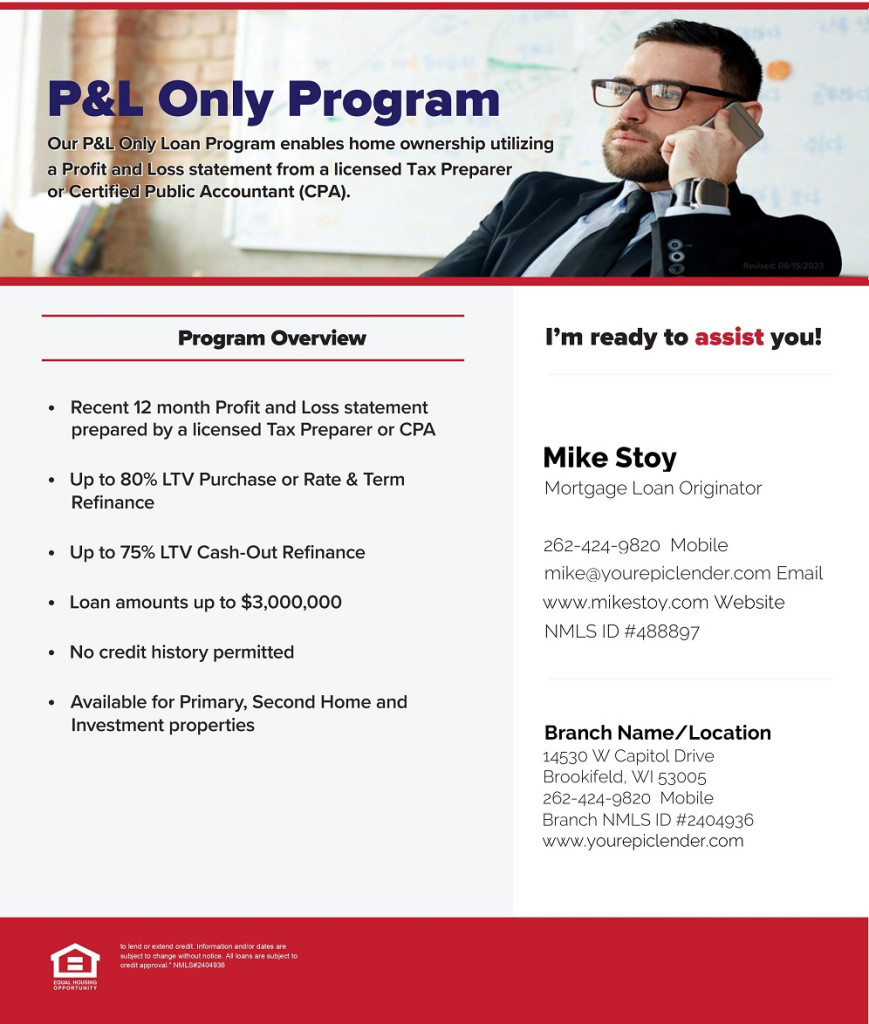P&L mortgage loans typically refer to mortgage loans for individuals or businesses that do not rely solely on traditional income documentation like pay stubs, W-2s, or tax returns to qualify for the loan. Instead, these loans consider the borrower's profit and loss (P&L) statements or income generated by their business as a primary source of income documentation. Here's an explanation of P&L mortgage loans:
Documentation Requirements:
Unlike traditional mortgage loans, where income is primarily verified through standard documentation, P&L mortgage loans rely on the borrower's profit and loss statements, which provide a detailed breakdown of income and expenses related to their business or self-employment.
Self-Employed Borrowers:
P&L mortgage loans are often used by self-employed individuals or business owners who may not have consistent pay stubs or traditional employment income. These borrowers can use their business income to qualify for the loan.
Business Income Consideration:
Lenders review the P&L statements to calculate the borrower's average monthly income. This income is used to determine the borrower's ability to make mortgage payments.
Credit Score and Credit History:
Like traditional mortgage loans, P&L mortgage loans typically require a credit check. A good credit score and credit history can improve loan approval chances and affect the interest rate offered.
Down Payment and Loan Terms:
The down payment requirement and loan terms for P&L mortgage loans can vary among lenders. Borrowers may need to make a larger down payment or accept slightly higher interest rates compared to conventional mortgages.
Interest Rates:
Interest rates on P&L mortgage loans can vary based on the borrower's creditworthiness, the down payment, and the lender's policies. Rates may be higher than those for borrowers with traditional income documentation.
Prepayment Penalties:
Some P&L mortgage loan products may have prepayment penalties, so borrowers should review the loan terms carefully.
Verification of Business Existence:
Lenders may require documentation proving the existence and legality of the borrower's business. This can include business licenses, registration documents, and tax records.
Limited Availability:
P&L mortgage loans are typically offered by specialty lenders or private lenders rather than traditional banks or government-backed lenders like Fannie Mae or Freddie Mac.
Risk and Considerations:
Borrowers should carefully consider the risks and benefits of P&L mortgage loans. While they offer flexibility for self-employed individuals and business owners, they can come with higher costs and interest rates.
Regulation:
Regulations surrounding alternative documentation loans, including P&L mortgage loans, have become stricter in recent years to prevent abuses and mitigate risks in the mortgage industry. Borrowers should expect to meet certain eligibility criteria and provide some level of documentation.
It's important for borrowers considering P&L mortgage loans to work closely with lenders and mortgage professionals who specialize in these types of loans. The requirements and terms can vary widely among lenders, and it's crucial to fully understand the terms and conditions of the loan before proceeding. Additionally, borrowers should consider seeking legal or financial advice to ensure they make informed decisions regarding their mortgage options.






